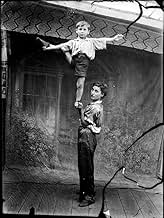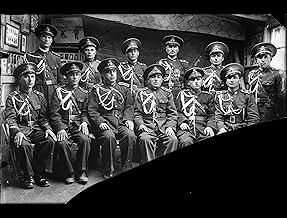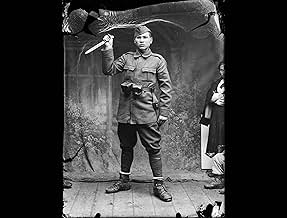Ajouter une intrigue dans votre langueA film constructed using the opposition of what a huge collection of recently discovered glass-plate photographs from the 30's and 40's tell us about Romania and what they do not show.A film constructed using the opposition of what a huge collection of recently discovered glass-plate photographs from the 30's and 40's tell us about Romania and what they do not show.A film constructed using the opposition of what a huge collection of recently discovered glass-plate photographs from the 30's and 40's tell us about Romania and what they do not show.
- Réalisation
- Scénario
- Casting principal
- Récompenses
- 1 victoire et 5 nominations au total
Avis à la une
This film could be thought of as the first part of a dilogy whose second is another Jude documentary, The Exit From the Trains (2020). The narration is taken from the memories of Jewish doctor and writer Emil Dorian. Dorian's text documents the slow but sure drift toward Nazi barbarity in the Romania of 1930. Jews are first forbidden to practice medicine, then other professions and are finally rejected from civil society altogether. They must prove their right to citizenship, and are assigned to hard labor in precarious conditions. Abuse steadily grows until June 1941, where Romania becomes a full fledged ally of Nazi Germany in Operation Barbarossa. Then, abuse becomes extermination and the Holocaust begins in full. Until the end of the war more than 300,000 Romanian and Ukrainian Jews were killed in Romania and territories under its control, One particular episode, the Iasi massacre of June 29, 1941 is the subject of Exit from the Trains.
The visuals are still photographs, black and white plates taken in a professional studio in a small town. They are mostly posed photos of wealthy peasants, professionals, families, children, ordinary citizens in ordinary circumstances. As the show goes on we see more military uniforms, exhibitions of guns and knives and Fascist salutes. The soundtrack consists mainly of propaganda speeches and patriotic songs, They promote fascist ideals: strength, loyalty, unity, sacrifice The photos don't show the terror later unleashed on the Jews, but rather the ordinary citizens who perpetrated it.
The Dead Nation is a provocative film that attempts to explain the unexplainable: how ordinary, mostly decent people can be brainwashed into murderers. It is an object lesson in documentary making and is particularly relevant now that Nazi collaborators are being rehabilitated in various European countries.
The visuals are still photographs, black and white plates taken in a professional studio in a small town. They are mostly posed photos of wealthy peasants, professionals, families, children, ordinary citizens in ordinary circumstances. As the show goes on we see more military uniforms, exhibitions of guns and knives and Fascist salutes. The soundtrack consists mainly of propaganda speeches and patriotic songs, They promote fascist ideals: strength, loyalty, unity, sacrifice The photos don't show the terror later unleashed on the Jews, but rather the ordinary citizens who perpetrated it.
The Dead Nation is a provocative film that attempts to explain the unexplainable: how ordinary, mostly decent people can be brainwashed into murderers. It is an object lesson in documentary making and is particularly relevant now that Nazi collaborators are being rehabilitated in various European countries.
The mix of newsreels and the personal stories makes it seems like it's a history lesson, but comes out as subjective as asking any political activist involved to write about the Yugoslav or Cypriot wars.
The emotional aspects masks any factual mistakes or general aspects of war, it's all black and white, good vs bad. I don't want to break or make anyone victime status, but the ending is beyond laughable to anyone that knows any post war Romanian history.
The production is abysmal, the images presented have almost nothing to do with the narration, at some point the disjointed pictures makes the movie frustrating and tiresome, like searching for words in an alphabet soup.
The emotional aspects masks any factual mistakes or general aspects of war, it's all black and white, good vs bad. I don't want to break or make anyone victime status, but the ending is beyond laughable to anyone that knows any post war Romanian history.
The production is abysmal, the images presented have almost nothing to do with the narration, at some point the disjointed pictures makes the movie frustrating and tiresome, like searching for words in an alphabet soup.
First, hats off to Radu Jude for making this film and others like it. We need these stories told so we never forget the history that - in Romania like in many other countries on both sides of the pond - has conveniently been ignored by dictators and nationalists (who masquerade as "patriots") alike.
Now on to the movie itself. It tries to use a clever technique of telling a story and showing images that are "dissonant". But for me that technique fell flat. It got to be tiring to the point where the visual dissonance distracted from the narrative. The pictures are not "in opposition" to the narrative, they're just random and at times plain weird. The point seems to have been that "how come the pictures from the era did not capture the tragedy that was going on". One can draw such a "conclusion" with any set of selected pictures. You can find a picture of the Santa Monica pier in 2008 and look - there's no indication of the recession that was going on. Huh? The point being? Can't a man pose with his cow anymore without the fear of being judged? Don't worry, you'll get the reference once you watch the film...
If one wants to find relevant pictures for the story being told in this documentary, look no further than the last half hour of a movie by the very same Radu Jude - "The exit of trains". It's not like these pictures don't exist.
I applaud Radu Jude for bringing these stories to the fore. Luckily many of his other movies on the topic have been better. Strictly on its merits as a movie, it's just "ok", bonus points for trying a novel technique. Watch it to hear the necessary story it tells, and don't expect to be amazed by its artistic qualities.
Now on to the movie itself. It tries to use a clever technique of telling a story and showing images that are "dissonant". But for me that technique fell flat. It got to be tiring to the point where the visual dissonance distracted from the narrative. The pictures are not "in opposition" to the narrative, they're just random and at times plain weird. The point seems to have been that "how come the pictures from the era did not capture the tragedy that was going on". One can draw such a "conclusion" with any set of selected pictures. You can find a picture of the Santa Monica pier in 2008 and look - there's no indication of the recession that was going on. Huh? The point being? Can't a man pose with his cow anymore without the fear of being judged? Don't worry, you'll get the reference once you watch the film...
If one wants to find relevant pictures for the story being told in this documentary, look no further than the last half hour of a movie by the very same Radu Jude - "The exit of trains". It's not like these pictures don't exist.
I applaud Radu Jude for bringing these stories to the fore. Luckily many of his other movies on the topic have been better. Strictly on its merits as a movie, it's just "ok", bonus points for trying a novel technique. Watch it to hear the necessary story it tells, and don't expect to be amazed by its artistic qualities.
It so happens (and maybe it was not just a coincidence) that I have seen 'The Dead Nation' ('Tara moarta' in Romanian) at the Haifa International Film Festival the very day that is declared in Romania as the National Holocaust Day. I saw the film in a hall where maybe one half of the viewers were survivors of the Holocaust or their immediate descendants. This very special documentary created by Radu Jude is part of a still open debate in Romania about the role and responsibility of its leaders and people in the Holocaust. It's the kind of event that cannot be judged only from the perspective of the film fan, because it includes so much history, politics and emotional charge.
Radu Jude shows again that he is a director who does not run away from controversy and who is not afraid of inventing new ways to put on screen his ideas and the messages that he considers as important. 'The Dead Nation' covers the years 1936 to 1944, the darkest period in the history of Romania and in the history of the Jewish community in this country, which counted almost one million people prior to WWII. While the country fell into nationalistic dictatorship, became an ally of Nazi Germany, implemented racial laws, and deported part of its Jewish population in ghettos and forced labor camps in occupied Russia and Ukraine, it also lost part of its territory to the neighboring USSR and Hungary, with the Jews being considered and scapegoats. However, there is no direct footage on screen about what happened. Instead, the director used a collection of photographs recovered from a photo studio in a small dusty town in South Romania of the epoch. Instead of pogroms, ghettos and death trains we see on screen the peasants, soldiers, nationalist militants in their festive but also daily lives occasions. And riffles. Many, many riffles. The soundtrack is more sophisticated, composed from a combination of nationalist Romanian songs, news reels commentary, speeches of the politicians of the time alternated with reading from the daily journal of a Jewish doctor - deprived of all rights, subject to fear, abuses, persecution. The message is the one of 'parallel lives'.
'The Dead Nation' lets the viewers make their own judgment, there is no off-screen comment that guides, explains, tries to make explicit points. There are no moving images, just a collection of stills pictures from the Acsinte collection of photographs. Viewers are left to judge by themselves. It belongs to a category of itself, maybe the only similar documentary that I can compare this film with is Claude Lanzmann's 'Shoah'. I can only wish that the public impact and contribution in understanding and assuming the dark history of the Holocaust will be - from the Romanian perspective - similar.
Radu Jude shows again that he is a director who does not run away from controversy and who is not afraid of inventing new ways to put on screen his ideas and the messages that he considers as important. 'The Dead Nation' covers the years 1936 to 1944, the darkest period in the history of Romania and in the history of the Jewish community in this country, which counted almost one million people prior to WWII. While the country fell into nationalistic dictatorship, became an ally of Nazi Germany, implemented racial laws, and deported part of its Jewish population in ghettos and forced labor camps in occupied Russia and Ukraine, it also lost part of its territory to the neighboring USSR and Hungary, with the Jews being considered and scapegoats. However, there is no direct footage on screen about what happened. Instead, the director used a collection of photographs recovered from a photo studio in a small dusty town in South Romania of the epoch. Instead of pogroms, ghettos and death trains we see on screen the peasants, soldiers, nationalist militants in their festive but also daily lives occasions. And riffles. Many, many riffles. The soundtrack is more sophisticated, composed from a combination of nationalist Romanian songs, news reels commentary, speeches of the politicians of the time alternated with reading from the daily journal of a Jewish doctor - deprived of all rights, subject to fear, abuses, persecution. The message is the one of 'parallel lives'.
'The Dead Nation' lets the viewers make their own judgment, there is no off-screen comment that guides, explains, tries to make explicit points. There are no moving images, just a collection of stills pictures from the Acsinte collection of photographs. Viewers are left to judge by themselves. It belongs to a category of itself, maybe the only similar documentary that I can compare this film with is Claude Lanzmann's 'Shoah'. I can only wish that the public impact and contribution in understanding and assuming the dark history of the Holocaust will be - from the Romanian perspective - similar.
Meilleurs choix
Connectez-vous pour évaluer et suivre la liste de favoris afin de recevoir des recommandations personnalisées
- How long is The Dead Nation?Alimenté par Alexa
Détails
Box-office
- Montant brut mondial
- 8 804 $US
- Durée
- 1h 23min(83 min)
- Couleur
- Rapport de forme
- 1.85 : 1
Contribuer à cette page
Suggérer une modification ou ajouter du contenu manquant

















